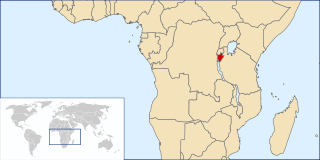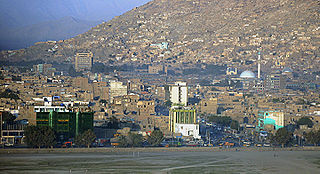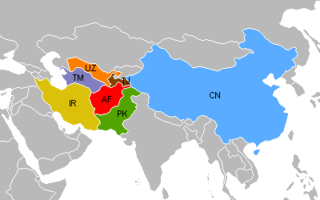The Bonn Agreement was the initial series of agreements passed on December 5, 2001 during an international conference on Afghanistan held in Bonn. It was intended to re-create the Islamic State of Afghanistan following the U.S. invasion of Afghanistan that followed the September 11, 2001, terrorist attacks. Since no nationally agreed-upon government had existed in Afghanistan since 1979, it was felt necessary to have a transition period before a permanent government was established. A nationally agreed-upon government would require at least one loya jirga to be convened; however, in the absence of law and order in the wake of the rapid victory of American and Afghan Northern Alliance forces, immediate steps were felt to be required.

The United Nations Assistance Mission in Afghanistan is a UN Special Political Mission tasked with assisting the people of Afghanistan.

United Nations Security Council resolution 1546, adopted unanimously on 8 June 2004, after reaffirming previous resolutions on Iraq, the Council endorsed the formation of the Iraqi Interim Government, welcomed the end of the occupation and determined the status of the multinational force and its relationship with the Iraqi government.

United Nations Security Council Resolution 1679, adopted unanimously on May 16, 2006, after recalling resolutions 1556 (2004), 1564 (2004), 1574 (2004), 1590 (2005), 1591 (2005), 1593 (2005), 1663 (2005) and 1665 (2006) on the situation in Sudan, the Council endorsed a decision by the African Union Peace and Security Council to move ahead with a United Nations peacekeeping force in Darfur as soon as possible.
United Nations Security Council resolution 1310, adopted unanimously on 27 July 2000, after recalling previous resolutions on Israel and Lebanon, including resolutions 425 (1978), 426 (1978), 501 (1982), 508 (1982), 509 (1982) and 520 (1982), as well as Resolution 1308 (2000), the Council decided to extend the mandate of the United Nations Interim Force in Lebanon (UNIFIL) for a further six months until 31 January 2001.

United Nations Security Council resolution 1337, adopted unanimously on 30 January 2001, after recalling previous resolutions on Israel and Lebanon, including resolutions 425 (1978), 426 (1978), 501 (1982), 508 (1982), 509 (1982), 520 (1982), and 1310 (2000), the Council decided to extend the mandate of the United Nations Interim Force in Lebanon (UNIFIL) for a further six months until 31 July 2001.

United Nations Security Council resolution 1369, adopted unanimously on 14 September 2001, after reaffirming resolutions 1298 (1999), 1308 (2000), 1312 (2000), 1320 (2000) and 1344 (2001) on the situation between Eritrea and Ethiopia, the Council extended the mandate of the United Nations Mission in Ethiopia and Eritrea (UNMEE) until 15 March 2002.

United Nations Security Council resolution 1375, adopted unanimously on 29 October 2001, after reaffirming all resolutions and statements by the President of the Security Council on the civil war in Burundi, endorsed efforts by South Africa and other states to implement the Arusha Accords and supported the establishment of an interim multinational security presence in Burundi.

United Nations Security Council resolution 1378, adopted unanimously on 14 November 2001, after reaffirming all resolutions on the situation in Afghanistan, including resolutions 1267 (1999), 1333 (2000) and 1363 (2001), the Council affirmed that the United Nations would play an important role in the country and called for the establishment of a transitional administration leading to the formation of a new government.

United Nations Security Council resolution 1386, adopted unanimously on 20 December 2001, after reaffirming all resolutions on the situation in Afghanistan, particularly resolutions 1378 (2001) and 1383 (2001), the Council authorised the establishment of the International Security Assistance Force (ISAF) to assist the Afghan Interim Authority in the maintenance of security in Kabul and surrounding areas. It was the final Security Council resolution adopted in 2001.

United Nations Security Council resolution 1401, adopted unanimously on 28 March 2002, after recalling all previous resolutions on the situation in Afghanistan, including resolutions 1378 (2001), 1383 (2001) and 1386 (2001), the Council endorsed the establishment of the United Nations Assistance Mission in Afghanistan (UNAMA). It would replace the longstanding United Nations Special Mission to Afghanistan.

United Nations Security Council resolution 1419, adopted unanimously on 26 June 2002, after reaffirming all resolutions on the situation in Afghanistan, particularly Resolution 1383 (2001) and resolutions 1368 (2001) and 1373 (2001) on terrorism, the Council commended the country for the successful conduct of an emergency loya jirga and called for co-operation from the Afghan people with the Transitional Administration.

United Nations Security Council resolution 1453, adopted unanimously on 24 December 2002, after reaffirming all resolutions on the situation in Afghanistan, the Council endorsed the "Kabul Declaration on Good-Neighbourly Relations" signed by the Afghan government and six neighbouring countries on 22 December 2002.

United Nations Security Council resolution 1464, adopted unanimously on 4 February 2003, after reaffirming its commitment to the sovereignty, territorial integrity and unity of Côte d'Ivoire, the council called for the implementation of the peace agreement signed at Linas-Marcoussis to end the civil war in the country.

United Nations Security Council resolution 1471, adopted unanimously on 28 March 2003, after reaffirming all resolutions on the situation in Afghanistan, the Council extended the mandate of the United Nations Assistance Mission in Afghanistan (UNAMA) for an additional period of twelve months until 28 March 2004.

United Nations Security Council resolution 1509, adopted unanimously on 19 September 2003, after recalling all previous resolutions on the situation in Liberia, including Resolution 1497 (2003), the council established the 15,000-strong United Nations Mission in Liberia (UNMIL) to assist in implementing a ceasefire and peace agreement.

United Nations Security Council resolution 1510, adopted unanimously on 13 October 2003, after reaffirming all resolutions on the situation in Afghanistan, particularly resolutions 1386 (2001), 1413 (2002) and 1444 (2002), and resolutions 1368 (2001) and 1373 (2001) on terrorism, the council extended the authorisation of the International Security Assistance Force (ISAF) for a period of one year and expanded its operations outside the capital Kabul to other areas.

United Nations Security Council resolution 1536, adopted unanimously on 26 March 2004, after reaffirming all resolutions on the situation in Afghanistan, particularly Resolution 1471 (2003), the council extended the mandate of the United Nations Assistance Mission in Afghanistan (UNAMA) for an additional period of twelve months until 26 March 2005.

United Nations Security Council resolution 1547, adopted unanimously on 11 June 2004, after welcoming the commitment of the Sudanese government and Sudan People's Liberation Army/Movement (SPLA/M) to work towards a full ceasefire and peace agreement to end the Second Sudanese Civil War, the council established a United Nations Advance Team in Sudan to prepare for a future United Nations operation following the signing of the Comprehensive Peace Agreement. The brief reference to the situation in the Darfur region divided Council members, with Algeria, China and Pakistan against a mention of Darfur and the other two-thirds of the council supporting its inclusion.

United Nations Security Council Resolution 1659, adopted unanimously on February 15, 2006, after recalling previous resolutions on the situation in Afghanistan, particularly resolutions 1378 (2001), 1383 (2001) and 1589 (2005), the Council endorsed the "Afghanistan Compact" between the Afghan government and international community concerning the future of the country.


















